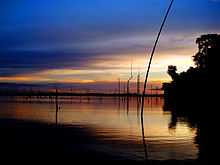Balbina Dam
| Balbina Dam | |
|---|---|
 | |
| Location | Amazon, Brazil |
| Coordinates | 01°55′02″S 59°28′25″W / 1.91722°S 59.47361°WCoordinates: 01°55′02″S 59°28′25″W / 1.91722°S 59.47361°W |
| Construction began | 1985 |
| Dam and spillways | |
| Impounds | Uatumã River |
| Length | 2,920 m (9,580 ft) |
| Height | 33 m (108 ft) |
| Reservoir | |
| Creates | Balbina Reservoir |
| Total capacity | 17.54 km3 (4 cu mi) |
| Catchment area | 16,502 km2 (6,371 sq mi) |
| Surface area | 2,360 km2 (910 sq mi) |
| Max. water depth | 30 m (98 ft) |
| Power station | |
| Operator(s) | Manaus Energia |
| Turbines | 5 × 50 MW |
| Installed capacity | 250 MW |
The Balbina Dam (Portuguese: Usina Hidrelétrica de Balbina) is a hydroelectric dam and power station on the Uatumã River in the Amazon Rainforest, Brazil. The location is under the municipality of Presidente Figueiredo jurisdiction, in the state of Amazonas.
It was built from 1985 to 1989 and is managed by Manaus Energia, under the Eletronorte system. The first of five generators began operating in February 1989. The dam has an installed capacity of 250 MW and floods a 2,360 km2 (910 sq mi) area.[1][2]
The dam was established to provide a renewable electricity supply to the city of Manaus but was considered by locals a controversial project from the start, due to the loss of forest and displacement of tribal homes grounds. It was also criticized for its expensive construction and maintenance costs.[3] As a result of the methane released from its vast reservoir, proportional to its output, the Balbina Dam emits more greenhouse gases than most coal plants.[4]
See also
References
- ↑ Hydroelectric power stations in Brazil
- ↑ Philip M. Fearnside (2006-08-26). "Balbina Dam, Amazonas". Department of Ecology, National Institute for Research in the Amazon (INPA). Retrieved 2007-12-04.
- ↑ Balbina
- ↑ "Dams in the Amazon: The rights and wrongs of Belo Monte". The Economist. 4 May 2013. Retrieved 5 May 2013.
| Wikimedia Commons has media related to Balbina Dam. |